In the new year, we are finally beginning to see the light at the end of the long-lasting COVID-19 pandemic tunnel. With the gradual relaxation of anti-epidemic measures, the revival of the industrial and commercial economy is now in sight. At the same time, the 20th CPC National Congress report has opened a new chapter for the future development of our country and Hong Kong. All of these have injected new momentum into the Hong Kong economy. The annual CGCC Forum, which was once again held simultaneously online and offline this year, invited government officials, experts and scholars to offer in-depth analyses of the new economic situation in Hong Kong, the Mainland and the wider world, as well as to discuss the opportunities and challenges facing Hong Kong.
Jonathan Choi: Hong Kong to continue strengthening its super-connector role
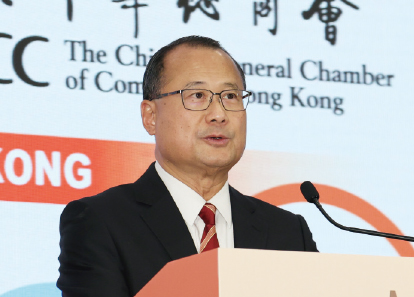
 Jonathan Choi, the Chamber’s Chairman, believes that the current gradual relaxation of anti-epidemic measures in the Mainland and Hong Kong, and the coming resumption of normal cross-border travel between the two places, are crucial to reinvigorating Hong Kong’s economy in this new year. At the same time, the Central Economic Work Conference has formulated systematic plans and specific policies for the economy for the new year, with particular emphasis on giving priority to expanding domestic demand, thus presenting huge new opportunities for Hong Kong to integrate into overall national development and further tap into the Mainland market.
Jonathan Choi, the Chamber’s Chairman, believes that the current gradual relaxation of anti-epidemic measures in the Mainland and Hong Kong, and the coming resumption of normal cross-border travel between the two places, are crucial to reinvigorating Hong Kong’s economy in this new year. At the same time, the Central Economic Work Conference has formulated systematic plans and specific policies for the economy for the new year, with particular emphasis on giving priority to expanding domestic demand, thus presenting huge new opportunities for Hong Kong to integrate into overall national development and further tap into the Mainland market.
Given such a situation, Choi stressed that Hong Kong must actively dovetail with the “14th Five-Year” Plan, the development of the Guangdong-Hong Kong-Macao Greater Bay Area (Greater Bay Area), the RCEP and the “Belt and Road” Initiative to help the country’s economy move towards higher-quality development and deeper reform and opening-up. He said that Hong Kong should enhance its function as a “super connector” and effectively play its “C.I.O.” role, i.e., as a Connector, Investor and Operator. With its wide business connections, sound transportation infrastructure and efficient professional services, it should serve as an important intersection point for the Mainland to attract foreign capital and go global, becoming a participant in the domestic circulation and a facilitator in the international circulation in the new dual-circulation development paradigm to actively seek new points of cooperation to inject new momentum into Hong Kong’s economy.
Paul Chan: Overcome objective constraints to strengthen development momentum
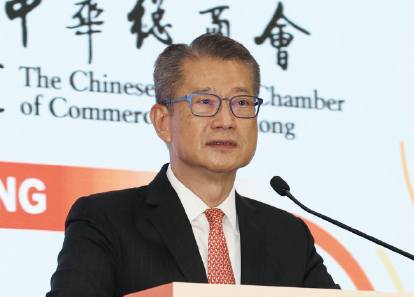
Looking back on 2022, Paul Chan, Financial Secretary of the HKSAR, said that the global economy experienced numerous trials and tribulations as it faced challenges due to geopolitical tensions, rising interest rates, tightening monetary conditions and intense competition among different economies. He added that the Hong Kong economy also allowed no room for optimism in 2022, with the three main economic growth drivers being exports, capital investment and consumption. Among them, the only stable driver was consumption, which would likely record a negative growth rate of 3.2% in 2022. At the same time, although the Mainland’s economy was affected by the pandemic, there was more scope at the policy level to set “stable economy and steady growth” as the prerequisite for development, so China became a stabiliser of the global economy and the most solid support for Hong Kong in the past period of time.
In the new year, given favourable factors such as having the pandemic under control and resumption of normal cross-border travel, Chan expects Hong Kong’s economy to grow steadily in 2023, along with strengthening public confidence in both consumption and investment. According to Chan, he remains confident about future development despite the existence of external environmental factors such as geopolitics, ongoing interest rate hikes and intense competition among different economies and the objective constraints such as land shortage and talent shortage facing Hong Kong. The current-term Government will be more proactive to deliver results and strive to attract more domestic and overseas enterprises and talents to Hong Kong by setting up the “Office for Attracting Strategic Enterprises”, the “Co‑Investment Fund”, and dedicated teams in 17 overseas offices. It will also actively expand the sources of land needed by pushing forward the Northern Metropolis and land reclamation in the Central Waters, thereby further strengthening Hong Kong’s development momentum.
Yu Yongding: Achieve the “two centenary goals” for modernization
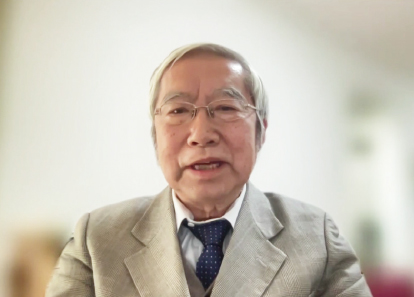
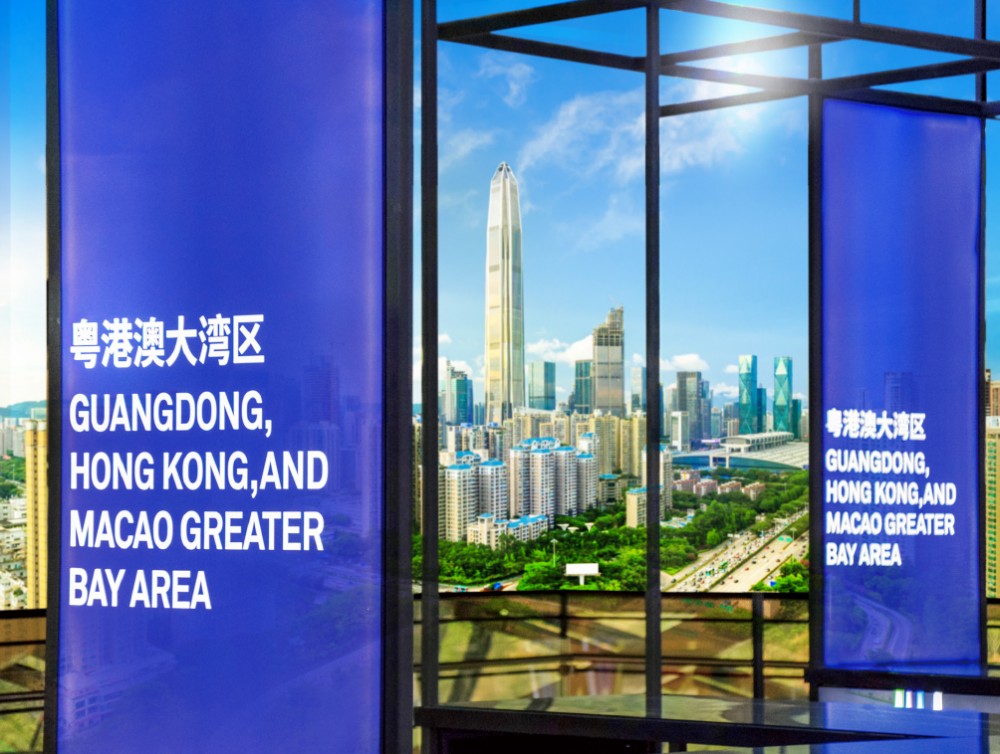 Yu Yongding, Academician of the Chinese Academy of Social Science, said that 2023 would be another challenging year for China’s economy. There is still a great deal of uncertainty about the effect of stimulating consumption and boosting exports, which need to be driven by supporting basic investment. He added that given the Central Government’s abandonment of the zero-COVID infection policy, the low inflation rate and the room for expansion in fiscal and monetary policies, the Mainland’s economy should be able to reverse the trend of “expected weakening” and form an upward trajectory. Therefore, the Central Government has set a GDP growth target of 6% for 2023.
Yu Yongding, Academician of the Chinese Academy of Social Science, said that 2023 would be another challenging year for China’s economy. There is still a great deal of uncertainty about the effect of stimulating consumption and boosting exports, which need to be driven by supporting basic investment. He added that given the Central Government’s abandonment of the zero-COVID infection policy, the low inflation rate and the room for expansion in fiscal and monetary policies, the Mainland’s economy should be able to reverse the trend of “expected weakening” and form an upward trajectory. Therefore, the Central Government has set a GDP growth target of 6% for 2023.
On the whole, Yu believes that the factors that slow down the Mainland’s long-term economic growth include population ageing, environmental constraints and the lagging of reforms, but there are many offsetting factors in reality, such as urbanization, industrial upgrading, technological revolution and human capital improvement. In his view, for China to achieve sustained and stable economic growth, the country must implement an expansionary macroeconomic policy, so the Central Government needs to significantly increase the deficit rate and the issuance of government bonds, raise the flexibility of issuing and using special-purpose bonds, and encourage local governments to make good use of special-purpose bonds. The central bank should also continue to keep interest rates low or even further reduce interest rates to help rejuvenate SMEs. At the same time, the Central Government must deepen economic system reform, especially to strengthen the protection of property rights of non-public enterprises and rule of law construction, and to continue to implement the various reform measures formulated by the Third Plenary Session of the 18th Central Committee, in order to ensure the realization of the “two centenary goals” for modernization.
Strengthen Industrial Momentum and Competitiveness
 For the panel discussion featured in the CGCC Forum, Bernard Chan, Under Secretary for Commerce and Economic Development Bureau; Benjamin Mok, Acting Commissioner for the Development of the Guangdong-Hong Kong-Macao Greater Bay Area; E Zhihuan, Chief Economist of Bank of China (Hong Kong); Duncan Chiu, Member of the Legislative Council for the Technology and Innovation Functional Constituency; Wilfred Wong, Chairperson of the Cross-industry Training Advisory Committee for the Human Resource Management Sector under the Qualifications Framework and Huang Chaoni, Vice President and Secretary General of the Hong Kong Green Finance Association were invited to be the guests to discuss how to further strengthen Hong Kong’s economic development momentum in the current economic and social situation.
For the panel discussion featured in the CGCC Forum, Bernard Chan, Under Secretary for Commerce and Economic Development Bureau; Benjamin Mok, Acting Commissioner for the Development of the Guangdong-Hong Kong-Macao Greater Bay Area; E Zhihuan, Chief Economist of Bank of China (Hong Kong); Duncan Chiu, Member of the Legislative Council for the Technology and Innovation Functional Constituency; Wilfred Wong, Chairperson of the Cross-industry Training Advisory Committee for the Human Resource Management Sector under the Qualifications Framework and Huang Chaoni, Vice President and Secretary General of the Hong Kong Green Finance Association were invited to be the guests to discuss how to further strengthen Hong Kong’s economic development momentum in the current economic and social situation.
Bernard Chan: Open up Hong Kong’s foreign trade and economic connections
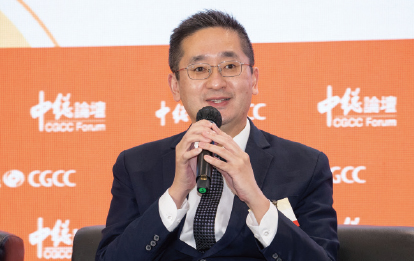
Chan said that in the next few years, the Commerce and Economic Development Bureau (CEDB) will actively sign free trade agreements with economies closely connected to Hong Kong, and further open up economic and trade connections, including further improving trade infrastructure projects and building a regional intellectual property trading centre. He further said that another focus of work in the future is to continue to advance the “Belt and Road” Initiative, and the CEDB will actively integrate into the overall national development landscape by having communications and discussions on policies with relevant ministries and commissions and holding forums and business matching activities in order to consolidate Hong Kong’s status as one of the most competitive economies in the world.
Given that the past three years have been a very difficult period for business operators, the HKSAR Government has introduced numerous measures to support SMEs in this regard. Chan stressed that going forward, the Government will continue to ease the capital turnover pressure on SMEs through existing or new support measures, and support them in expanding their markets and businesses after the pandemic to enhance their competitiveness.
Benjamin Mok: Greater Bay Area is entry point for integration into national development
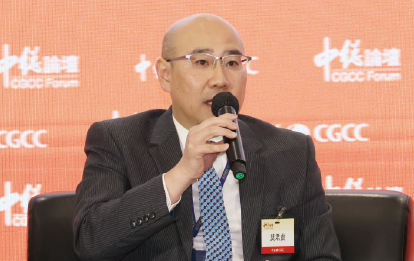
At present, Hong Kong is in a very critical period for rapid growth. Mok stressed that the development of the Greater Bay Area is an important entry point for integration into overall national development. One of the top priorities of the Steering Group on Integration into National Development, which is chaired by the Chief Executive, is to foster a greater flow of people, goods and capital to strengthen high-level cooperation among cities within the Greater Bay Area.
Mok said that the HKSAR Government has been maintaining close cooperation with many cities in the Greater Bay Area to jointly promote the development of the area based on the principle of mutual reinforcement of strengths. In this regard, key initiatives have been rolled out in different fields to not only help Hong Kong residents and enterprises to take advantage of the development opportunities in the area, but also assist enterprises in the Mainland cities in the area to enter the international market, thus further playing Hong Kong’s role as a super connector for the Mainland to attract foreign capital and go global.
E Zhihuan: Full return to normal is the driving force for Hong Kong’s economic recovery
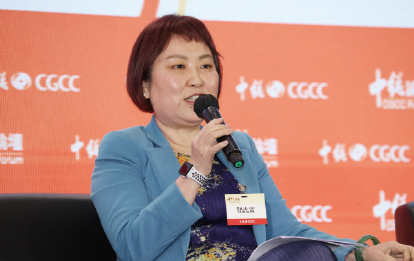
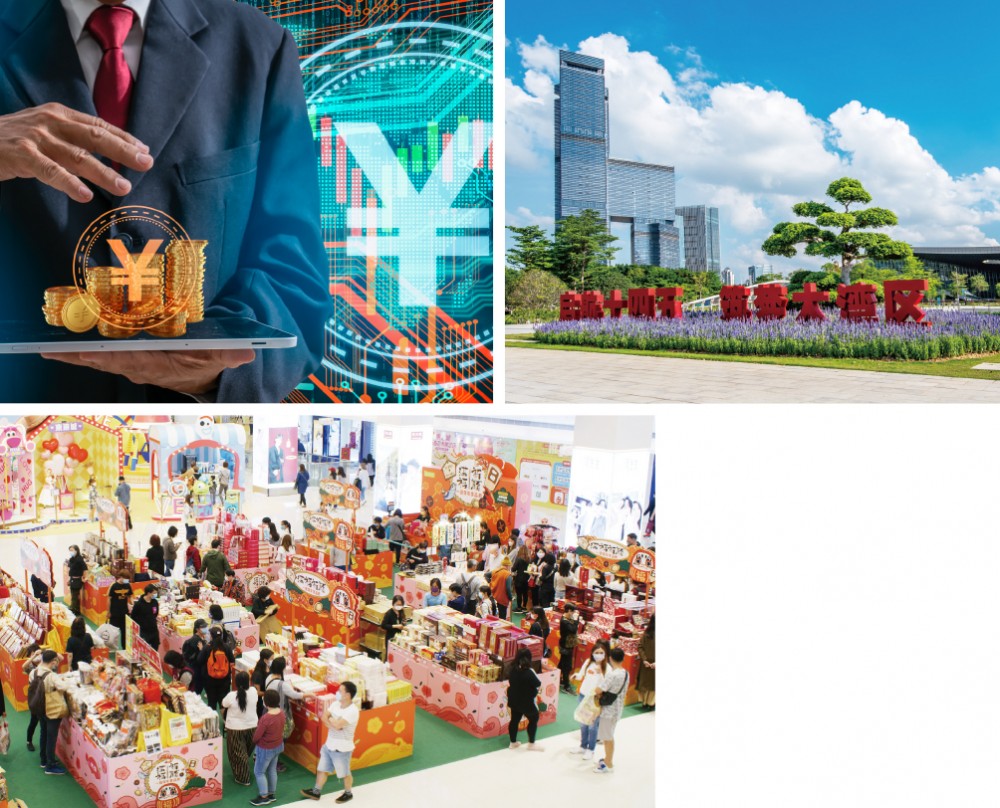 E said that many international organisations have lowered their global economic growth forecasts for 2023 due to increased risks of global “stagflation” amid the ongoing geopolitical uncertainties. Faced with the severe external environment, she expects Hong Kong’s trade growth to be weak as well. Boosted by the resumption of cross-border travel with the Mainland, consumption in Hong Kong will become the driving force for Hong Kong’s economic recovery.
E said that many international organisations have lowered their global economic growth forecasts for 2023 due to increased risks of global “stagflation” amid the ongoing geopolitical uncertainties. Faced with the severe external environment, she expects Hong Kong’s trade growth to be weak as well. Boosted by the resumption of cross-border travel with the Mainland, consumption in Hong Kong will become the driving force for Hong Kong’s economic recovery.
E stressed that Hong Kong must actively integrate into overall national development. The “14th Five-Year” Plan fully supports Hong Kong in its efforts to upgrade four traditional centres and develop four emerging centres. In addition, the development of the Northern Metropolis will become another development opportunity for Hong Kong. When completed, Hong Kong’s urban space, where it has focused more on the south than the north, and economic structure will be completely transformed. Externally, she believes that Hong Kong must seize the opportunities brought by the Regional Comprehensive Economic Partnership Agreement (RCEP). Hong Kong’s accession to the RCEP will help further promote foreign trade and bring new business opportunities to Hong Kong’s cross-border financial services, thus further boosting Hong Kong’s status as an international financial centre.
Duncan Chiu: Fintech development in Hong Kong has promising prospects
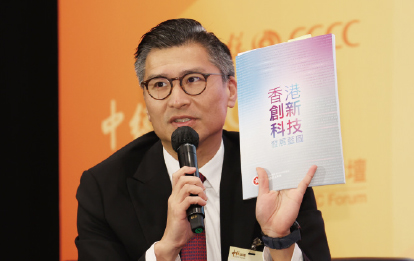
Regarding Hong Kong’s active promotion of innovation and technology (I&T) development in recent years, Chiu said that the HKSAR Government’s new blueprint for I&T development and the country’s strong support will give Hong Kong a broader space for development in this regard as it will have the support of the huge domestic demand market and access to scientific and technological talents. Coupled with its strengths such as the protection of intellectual property rights, all these will fill various sectors with confidence in the future development of I&T in Hong Kong.
Looking back on the past decade or so, Chiu said that science and technology development in Hong Kong has progressed from the application of science and technology in the early stage, to the addition of communications, and then later to the combination with innovation, entrepreneurship and industries, gradually linking science and technology with related industries. He stressed that Hong Kong has a broad space for fintech development and can especially leverage its strengths in legal system and intellectual property protection to promote the innovative development of fintech and the various areas around it. He also mentioned that under “One Country, Two Systems”, Hong Kong can help the Mainland promote the development of virtual assets which are still restricted there.
Wilfred Wong: Adopt two-pronged approach to build talent pool
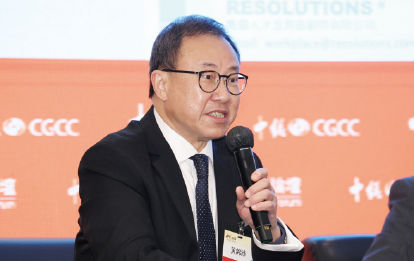
 Wong said that talents are the engine that strengthens the momentum and competitiveness of Hong Kong’s industries. President Xi Jinping has also stressed that we must regard science and technology as our primary productive force, talents as our primary resource, and innovation as our primary driver of growth. In his view, our country’s thorough implementation of the strategies for development through science and education, improvement of the systems for scientific and technological innovation, and acceleration of the innovation-driven development strategy will boost Hong Kong’s I&T industries.
Wong said that talents are the engine that strengthens the momentum and competitiveness of Hong Kong’s industries. President Xi Jinping has also stressed that we must regard science and technology as our primary productive force, talents as our primary resource, and innovation as our primary driver of growth. In his view, our country’s thorough implementation of the strategies for development through science and education, improvement of the systems for scientific and technological innovation, and acceleration of the innovation-driven development strategy will boost Hong Kong’s I&T industries.
Wong said that to enhance its talent development, Hong Kong must not only recruit high-quality talents, but also strengthen manpower training and education. At present, as it must push for the development of a talent pool, Hong Kong can recruit high-quality talents by formulating policy plans and quality talent admission schemes. It should also improve its own education and qualification framework to nurture local high-quality talents, as well as promote the development of diversified industries and a high-quality living environment to retain talents in Hong Kong.
Huang Chaoni: Strengthen interconnection with Greater Bay Area in green finance
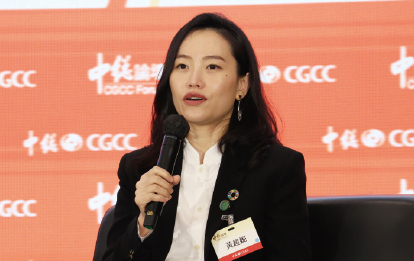
Huang said that the acceleration of green finance development in Hong Kong in recent years will help the Mainland in its efforts to achieve carbon peaking by 2030 and carbon neutrality by 2060, and investment for the green economy is estimated to reach RMB48 trillion in the future.
In Huang’s view, as an international financial centre, Hong Kong can serve as a bridge for overseas funds to enter the Mainland market to meet the Mainland’s green financing needs. She said that since the Mainland has huge high-carbon assets, Hong Kong can collaborate with the Greater Bay Area to develop an international high-quality voluntary carbon market where international investors can participate in the Mainland’s carbon market. Hong Kong can also strengthen interconnection with the Greater Bay Area in green finance and help the area adopt international practices in terms of definitions, standards and products of green finance.




